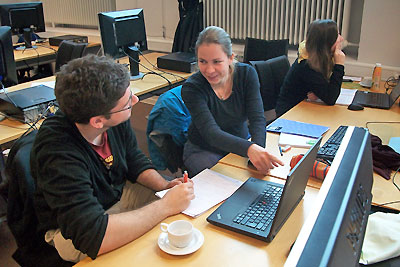|
|
|
| Fig. 1: Discussing surprising exercise results. In front: Johannes Keller (also from IBG-3) and Dorina Walther Copyright: Hieu Mai |
PhD Course “Spatial Uncertainty propagation”
Nov 10-13, 2015, Copenhagen, Denmark
The four-day PhD Course “Spatial Uncertainty Propagation” was organized by the HOBE Center for Hydrology (Denmark) and took place in Copenhagen. Gerard Heuvelink and Sytze de Bruin from Wageningen University taught statistical methods to estimate, propagate and reduce uncertainty to 16 curious PhD students from various countries and research fields. We started the week with an introduction to geostatistics and immediately applied our new knowledge by computing soil pollution risk maps. This efficient iteration between well-prepared lectures and computer exercises accompanied us the whole course.
This way we not only learned a lot of theory on Taylor series expansion and Markov chain Monte Carlo methods but also made an uncertainty propagation for a flood event and Bayesian calibration for multiple parameters. We discussed interesting cases, like the ensemble mean elevation model resulting in a larger flood than any realization. R language was used for all our computing exercises which was very fortunate for me because I use R regularly and got to know many interesting packages and functions which will be helpful for my future work. The course had a focus on hydrology and the environmental but contents can be applied to many different fields of science. In short presentations all participating PhD students could present their research and so I learned that spatial uncertainty is as well important for waste engineering and real estate economics. A delicious dinner HOBE invited us for at the first evening was a great opportunity to get to know the other students, lectures and HOBE members.
PhD Student: Dorina Walther - Project D7: Catchment Tomography, IBG-3: Agrosphere, Forschungszentrum Jülich











